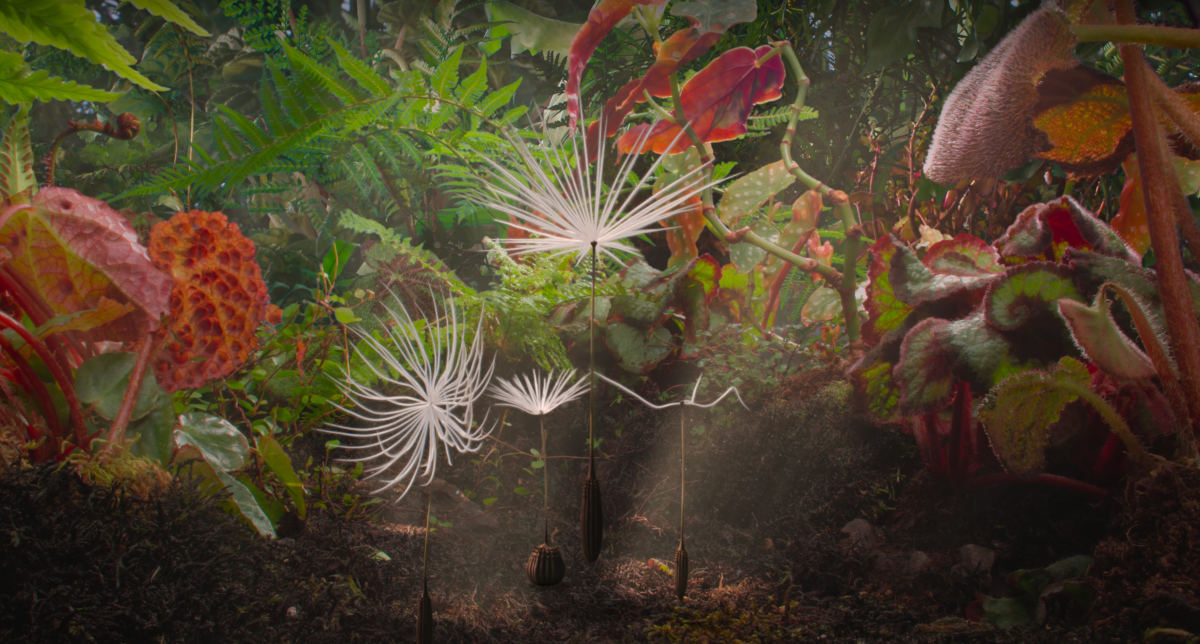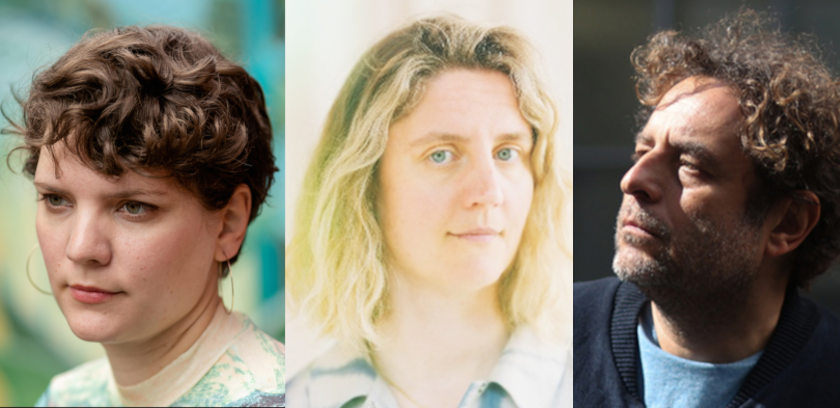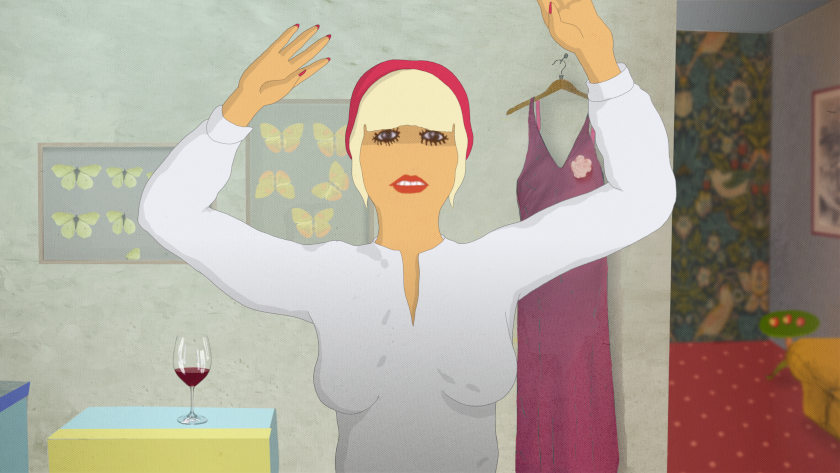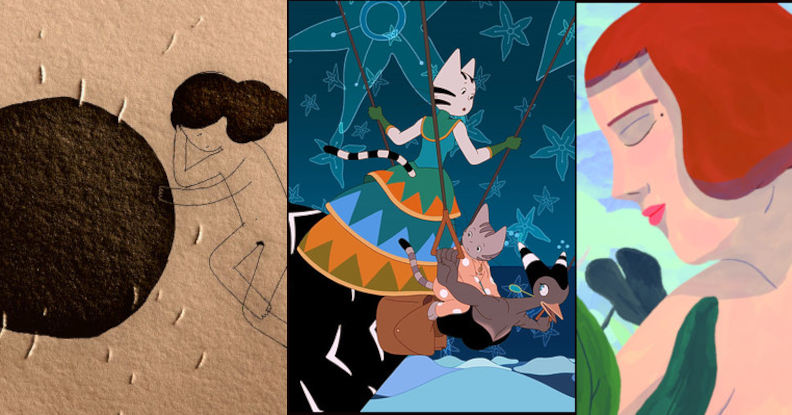Flóra Anna Buda: Curation of Short Animation Film Really Matters Online (Indie Online 2020 Project)
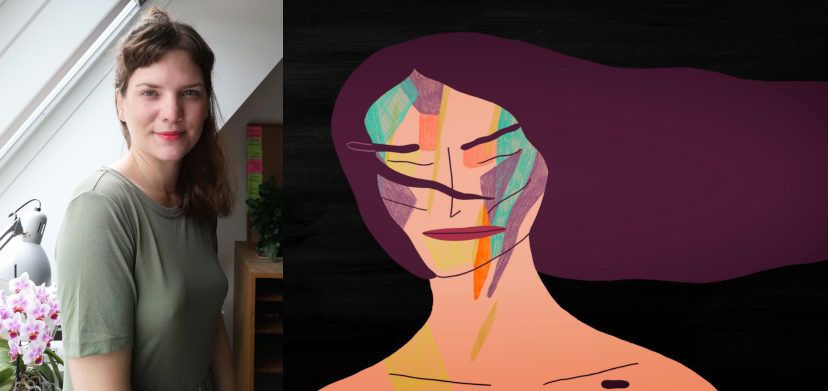
Hungarian animation director Flóra Anna Buda first came into the international animation film circuit with her graduation film, Entropia; premiering at Berlin Film Festival 2019, the film and won the Teddy Award at the same festival.
In this interview, Flóra Anna Buda narrates her own experience, challenges and adaptation process she had to go through as a filmmaker and a person during the pandemic, and her own response to our increasing aspect of online life. She's now preparing a new project, 27- My Last Day At Home. (Her interview is part of our interview series in the Indie Online 2020 project, headed by Michelle Kranot and supported by The Animation Workshop).
VK: If you turned back the clock in the lockdown period, how would you find yourself?
FAB: I was obviously frustrated like all of us. I was anxious because I didn't know what was about to happen. I was in my Viborg room here in Denmark (where I'm also now), as part of the Open Workshop Residency of The Animation Workshop. It was a kind of special situation; we were a couple of artists here together. We were not that separated, and I didn't feel really claustrophobic, because we had each other. It was already a nice experience.
I think I was very lucky with the lockdown; Entropia was already in the festival circuit for one year and a half. So I had the chance to visit the festivals before the lockdown started. I couldn't of course visit the festival that took place after the lockdown.
VK: So, you couldn't attend the festivals, but your film was still shown at the festivals.
FAB: Yes! Luckily there were many online editions, and festivals showing my film, and started asking me to make videos to present the film which is very nice and I love to make it. I also think this is a bit complicated thing for a director - and I heard it from many other directors as well because it's quite consuming, but of course I did as many as I could. I also tried to watch the selected films as much as I could.
VK: What was your own thinking behind making those videos? Was the reasoning that I'd like the audience to watch me talking about the film as well?
FAB: I felt respect for the festival organizers. Going online must be an enormous amount of work, and I felt respect for the festivals who decided to go online -because, at the same time, there were many festivals that had to be canceled. And it was very sad to get all those letters -not because of my film, but because of the festival itself. So I felt we all have to put something in the common pot; my part was making these videos.
VK: Did you actually feel that some festivals treated you better than others? Did you experience any disrespect for you as a filmmaker?
FAB: On the contrary, I experienced an extreme kindness from festivals, whether the festival was online or not. But now I feel everyone is a bit emotional about festivals. It's a big thing to organize a festival online, so everyone puts their own heart to it.
They're also have to ask for putting the films online; I wouldn't do this normally before 2 years of festival run. I'm glad to share it with the audience; even though it's online, I don't mind. I think I was touched many times by the letters of the festivals.
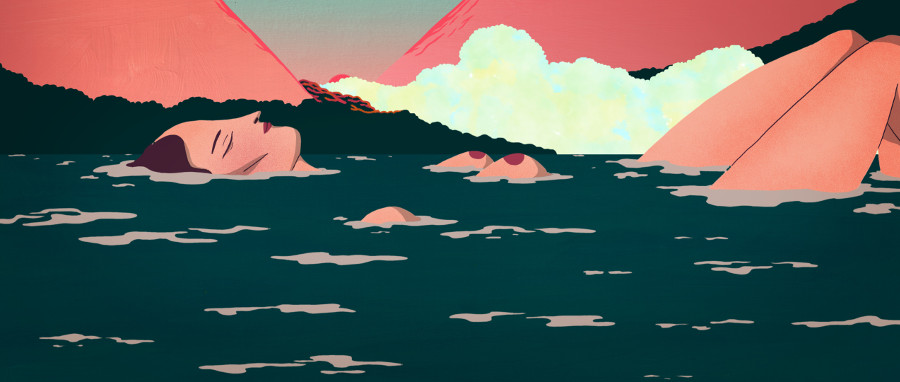
VK: How did you experience content being online? You couldn't travel to festivals, but there was an abundance of content (panels, talks etc.) you could watch from your own sofa. Did you feel actually an opportunity here or perhaps the whole situation overwhelming?
FAB: It was overwhelming, already at the point of watching films online -you had such a big choice. And if you decide to go to the cinema, you give your full attention to the films and directors. But if you watch online, you have to put yourself in that mood, and for me that's extra energy. It's a different experience; I don't think it's necessarily bad, but you need to get yourself adapted to the situation, and be able to treat the films in the same way as if you were to see it at the cinema. It takes some time; because I'm used to consuming things online simultaneously.
But now a whole world has opened up; I don't think it's necessarily bad. Many directors had this feeling that we make a film, and the audience gets it only after two years. It goes to festivals, and not all audiences who can watch it can watch the festivals. This is now changing, and maybe it's for good.
VK: So, do you think that things would be better for Entropia if the lockdown occurred two years ago? Let's imagine a situation where you had premiered in February in Berlin, and the lockdown occurred in March.
FAB: Now that I know how much fun is to go to festivals, I'd obviously be disappointed. The festivals are a nice place to meet people; this I would really miss. But in theory, I'd like to reach the audience faster. Within this two years of festival run, you have so many new ideas that you want to share, but you are being put in a box dated two years before -and time has changed since then.
Watch Entropia Trailer by Flóra Anna Buda
VK: When did you start making the 27- My Last Day at Home animation short?
FAB: The idea came up last December, when I was still in Budapest, and I already knew I'm going to be in Viborg from January 2020. So, I came to Viborg with some concept art, and I wrote the script here. When the pandemic started, I was in the storyboarding phase. I had to stop working because I couldn't focus that much, for a few weeks. So, I was drawing for myself, and I made a series of drawings; it was really satisfying and helped me adapt to the situation, and work on my film afterwards.
VK: Do you have any development fund secured for 27- My Last Day at Home at the moment?
FAB: This is a French-Hungarian co-production between MIYU Production in Paris and Boddah in Budapest. We won the Annecy Ciclic Prize and the related fund and we also have ARTE on board. Unfortunately we were rejected twice at the Hungarian funds (for film production).
VK: Because of the nature of the project or because of the fund scarcity?
FAB: They didn't give funds for almost two years, because they were re-organizing the whole system. And now they definitely had to have money, but I don't know the reason. But in general LGBTQ content or sexuality it's not really recommended right now.
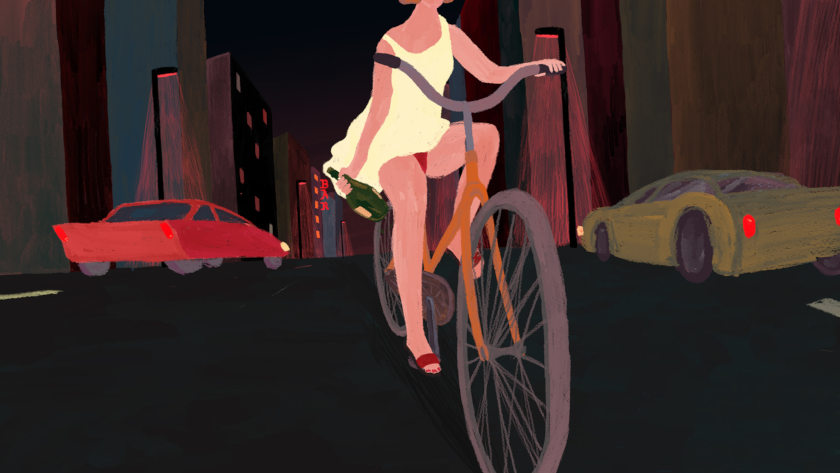
VK: Would some people use the pandemic as an excuse to reject films they don't like?
FAB: I think they're quite straightforward about it, at least at the highest level of government politics. They are really against gender equality. Also in the women's situation, we still have a lot to fight for. It gives me extra motivation to make this film with or without their help.
VK: They're not impressed about festival prizes etc? What did they ask you at the interview?
FAB: I didn't get to this round, where they actually invite you for an interview. It takes three rounds to apply to the Hungarian fund; I was rejected at the first round both of the times. Many other great directors were rejected as well.
VK: You had to prepare for Annecy. What was your workload for this event?
FAB: When I got to know that we had to make a video pitch, I was really glad; it felt like a challenge and something exciting to work on. Of course, it takes time away from the project. But it was exciting; I had to learn to speak in front of the camera, and I tried my best.. So in April-May, I went out to shoot the video pitch, and the flowers were blooming... It was a different experience from being in my room.
I was very lucky during the lockdown. We were supposed to be in our rooms, and we couldn't use the workshops area of The Animation Workshop. So, everything happened in the room. But I had the chance to work at a friend`s place, so I could make the animation tests there. We were communicating online with our producers. They had their part in the video pitch. All in all it was quite exciting at the end. I hadn't made a video pitch before, and I wanted to make it interesting. I felt a little like I was making a school project.
In the end, I was really missing the real audience. In real time, you use a lot of energy and adrenaline. It is very difficult to be spontaneous in a recorded video pitch. But I tried to have my pitch containing imperfections. Still, if I had the opportunity to make a live pitch, I'd prefer it.
VK: Did you actually have the time to watch the other Annecy pitches?
FAB: We actually made a little Annecy event in our living room. We got a TV set (which we got for the lockdown), to have a little bit of entertainment. So, I sat with all Open Workshop animators, and we watched the pitches on the big TV set. It wasn't as nice as the Annecy itself, but it was nice enough. I hate to say it, but lockdown meant a lot of progress to me both in my work and emotionally.
VK: Did you have to think things differently because of the lockdown and the pandemic? Apart from the video pitch making?
FAB: Apart from the first two weeks, I was very productive; it was the only way I did not focus on the news. It's not so easy for me to have a schedule and routine. My routine changes all the time depending on the task I'm making. So at the beginning it was hard for me to work and sleep and eat in the same room but after a while I got used to it.
VK: Was it different being in a different country?
FAB: Viborg is a small city, and we didn't have many covid-19 cases. So, I really had the time to go out without wearing a mask. There are not many people on the street, with or without a mask. I still cannot see and visit my family and friends in Budapest maybe this is the most crucial difference.
VK: You were not tempted to re-think about your project creatively during this time?
FAB: No, because my project is already about a woman feeling claustrophobic in her life; It was a good inspiration, because she's already feeling like being in a lockdown in her life. I hate to say this, but it was just perfect.
VK: Things that you hated during this period or things that could have been made better? What's your approach as a filmmaker and also as an online content consumer?
FAB: In Annecy for example, the online version was similar to the physical event when it comes to the group of films. The competition group of films, for instance, was different from the non-competition films. It wasn't different to choose between the blocks, and I could actually watch more programmes, because I didn't have to move from one venue to the other. And I could watch the programmes whenever I wanted.
VK: Did you have any preferences for more educational things than films?
FAB: We were watching shorts with friends. If someone were too loud with the popcorn, we could tell each other to be quiet. But generally speaking I'm very pro-cinema. I love the big screen, the sound system and the audience reaction. it's hard to compare the two.
As a filmmaker, you have to be really adaptable, because everything is changing around you. Adapt to the film funds, to the deadlines and the phases of the work. So, I don't find it uncomfortable to adapt to this online situation; it's a different way of consuming short films. I believe in a silver lining in everything.
VK: What are your lessons learned during this period?
FAB: I had to learn to speak in front of the camera, which was crucial. It was hard: as an animation director, I was supposed to be a geek sitting in front of a computer by myself. Real festivals were already a step forward in communicating with people; you had to be there, and communicate with people. Entropia was my graduation film, and it was like jumping in deep water to start at the Berlinale. The online thing moves this a bit further; you're recording yourself and you have to be conscious of what information you want to share and often it stays on the web. I had to direct myself.
VK: How did you feel about it?
FAB: It was intimidating and very educational; the facial expressions, the way I pronounce words I was never conscious about. But now I'm going to record the dialogues myself for the animatic stage of my film, and I think it was a good practice for me actually.
VK: Did you hate anything when watching other people's work online?
FAB: Yes, but not because of the festivals or the directors. I reached a stage of my film process, where I had difficulties digesting films in general and I felt like I have to just focus on my own stuff. Even if it's online, I still decide what I want to see. So I didn't feel like I have to watch it because it's available.
VK: If you were put in a global committee for animation, and you were asked to give your advice on the upcoming online situation, what would you do regarding it? How would you like your film to be viewed in the best possible circumstances in its curating process?
FAB: I think it would be nice to have a global collection of short films, like an online platform where you can watch curated short films. It really does matter to have a nice curation and programmes which somehow fit each other. You can't put every short film next to each other. So, I'd prefer a curated selection. But if it's online and we don't have a chance to talk to the audience about our film, it's a complicated thing. Online Q&As are nice, but it's weird and you have to be brave. In real life, the microphone comes to you, and you just talk. In a Skype/Zoom call, it's different, and I guess I have to get used to it.
I`d definitely like reaching a bigger audience. But I feel the online world is already like that. I think it's a testing period. Most people reach out and write to filmmakers, letters or short messages on Instagram. There are many possibilities to watch films online and talk to directors, and we need to figure out our best possible way.
- Read Also: Our Interview Series on Independent Animation Online (Indie Online 2020 Research Project)
About Flóra Anna Buda
Flóra Anna Buda is a Hungarian animation filmmaker, graduated at MOME, Budapest. One of her main goals is to keep searching for new ways of creating universes and telling stories. She is deeply interested in dreams and science but she likes to twist her stories with personal content. Her goal is to find a way to create an artistic project out of her recent interest with an open mindset.
The interview was conducted October 2020 (interviewer Vassilis Kroustallis). It is part of the Indie Online 2020 research project, headed by Michelle Kranot and supported by The Animation Workshop/VIA University College, Center for Animation, Visualization and Digital Storytelling, Denmark.Viborg.




